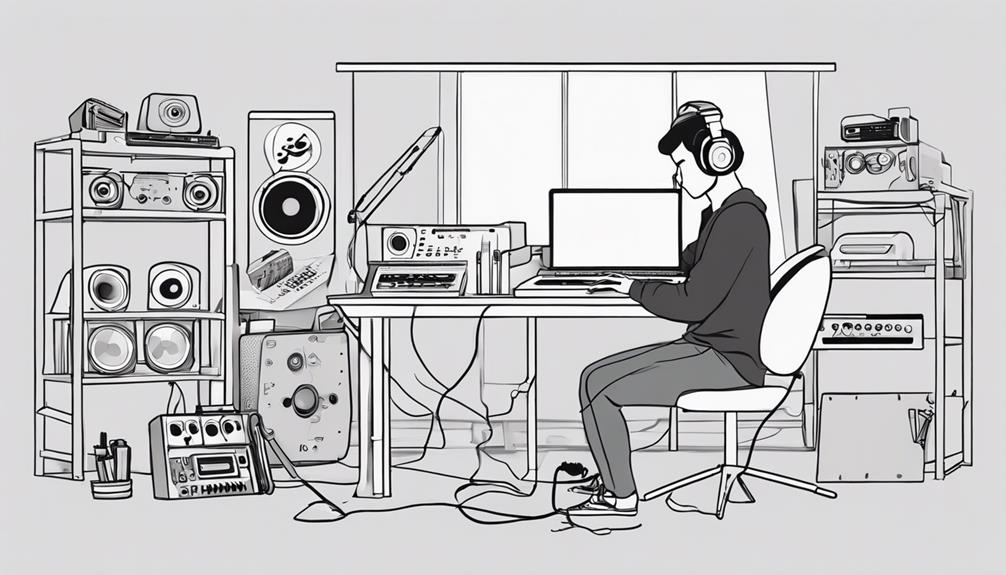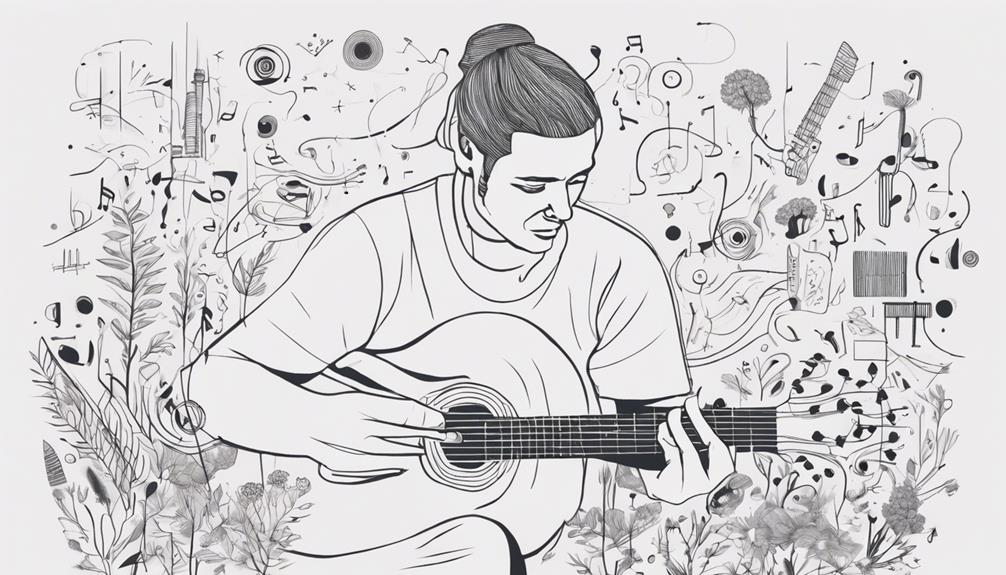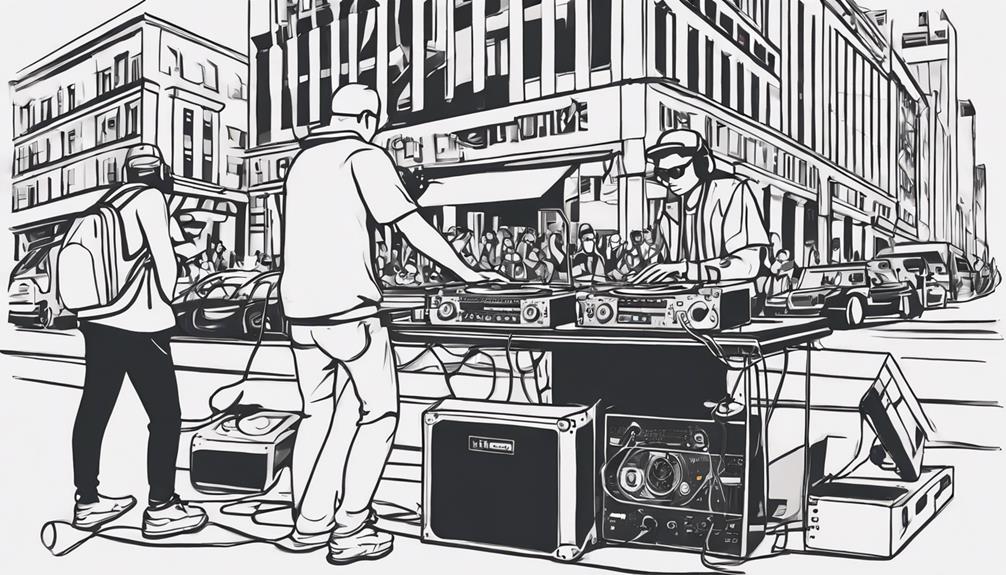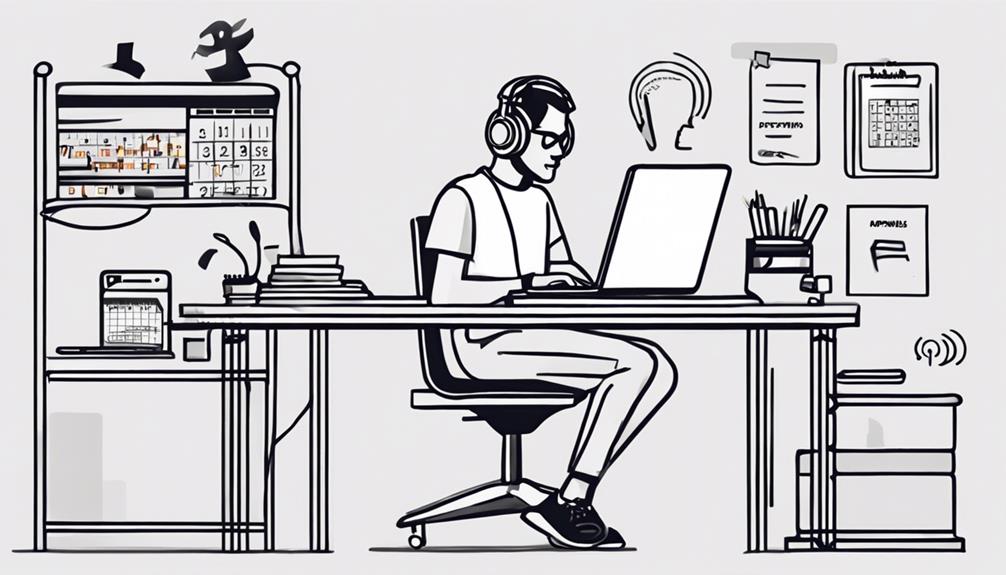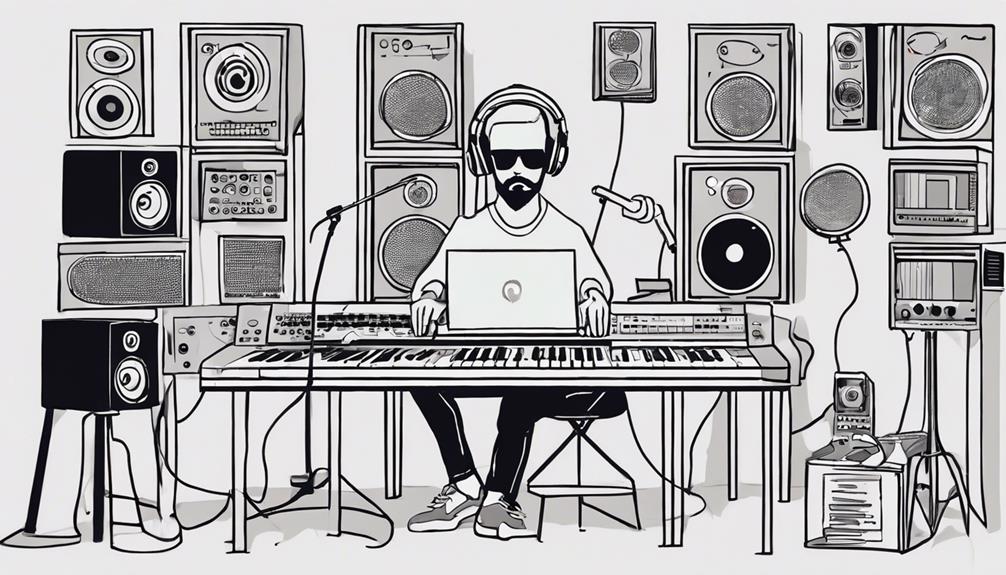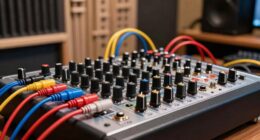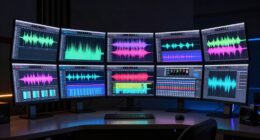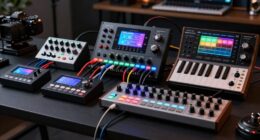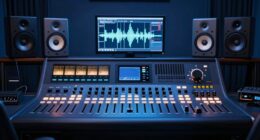Ready to start your music production journey? Begin by mastering a Digital Audio Workstation (DAW) like FL Studio or Ableton Live. Experiment with MIDI controllers, virtual instruments, and plugins. Immerse yourself in music theory basics to understand notes, scales, and chords. Explore different DAW options and unique features. Cultivate creativity by exploring sounds and techniques. Develop a perseverance mindset and trained ears. Showcase your distinct sound and consider pursuing certifications. Embrace the creative process by honing your craft daily. Your journey into music production is just beginning – discover more ways to enhance your skills and explore your creativity.
Key Takeaways
- Choose a Digital Audio Workstation (DAW) like FL Studio or Ableton Live.
- Learn music theory basics: notes, scales, chords, and rhythm.
- Experiment with virtual instruments, VST plugins, and mixing techniques.
- Practice consistently, embrace creativity, and persevere through challenges.
- Seek online resources, workshops, and classes for hands-on experience.
Overview of Music Production
Music production involves the development, creation, and refinement of recorded music through various processes. As a budding music producer, learning to navigate a Digital Audio Workstation (DAW) is where you'll start creating your musical masterpieces.
Many successful producers are self-taught, using online resources and experimentation to hone their skills. The beauty of music production lies in its accessibility; with a computer and the right software, you can kickstart your journey into the world of producing.
Being a music producer means more than just creating beats; it involves directing the artistic vision of a project, coordinating recording sessions, and crafting the overall sound. Different genres may require varying approaches, with genres like R&B and hip-hop often focusing on intricate beat-making.
In today's music landscape, self-production is on the rise, with artists taking control of their creative process by producing their own tracks. Embrace the learning process, experiment with different techniques, and let your passion drive your skills to new heights in the field of music production.
Essential Tech Skills for Beginners
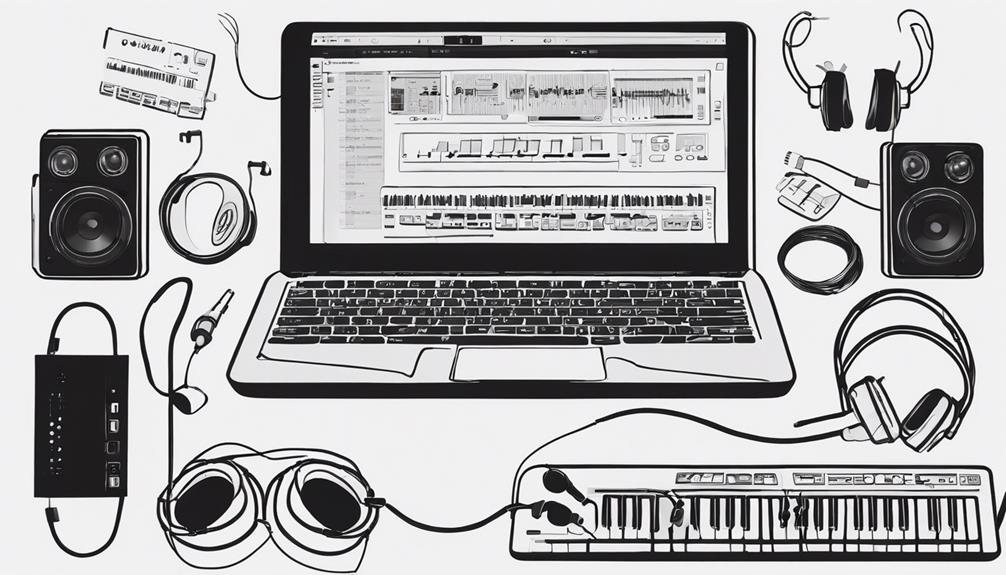
To immerse your journey in music production, it's vital to familiarize yourself with key tech skills for beginners. Begin by mastering a Digital Audio Workstation (DAW) like FL Studio or Ableton Live. These platforms serve as the foundation for creating music, allowing you to arrange, record, edit, and mix your tracks.
Utilize MIDI controllers to input musical notes and commands into your DAW, enhancing your creative process. Invest in an audio interface to guarantee high-quality recordings and seamless connectivity with your equipment.
Virtual instruments and VST plugins are powerful tools for adding diverse sounds and effects to your compositions. Experiment with chord creation to develop harmonies that resonate with your audience.
Delve into the world of mixing and mastering to refine the balance, dynamics, and overall quality of your tracks. By honing these essential tech skills, you pave the way for a successful music production journey.
Learning Music Theory Basics
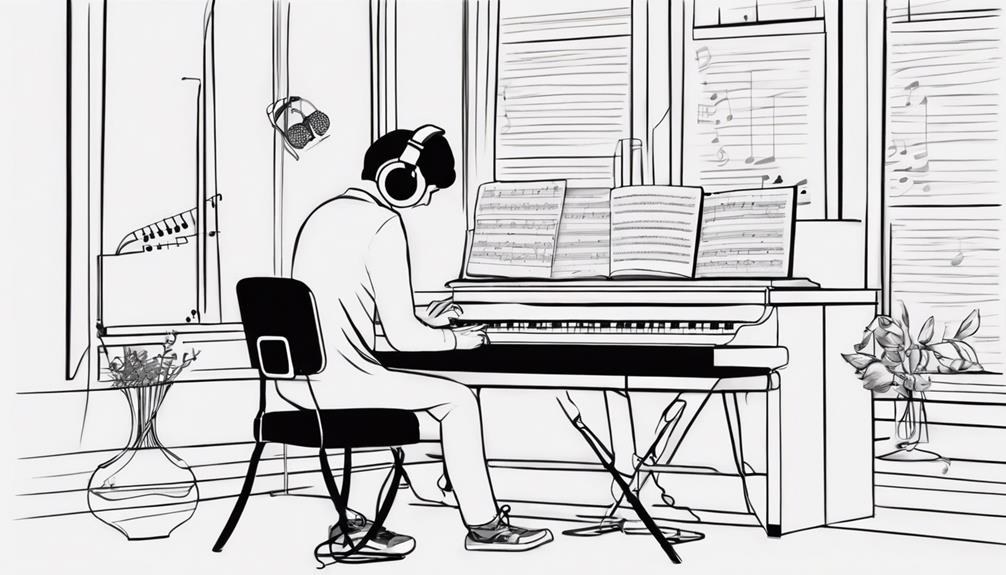
Mastering the fundamentals of music theory is essential for aspiring music producers. To start, familiarize yourself with notes, scales, chords, and rhythm. Understanding how these elements work together will lay a strong foundation for your music production journey. Additionally, exploring how to read sheet music and interpret musical notation is vital for creating and analyzing compositions effectively.
As you dive deeper into music theory basics, investigate harmonic progressions, intervals, and key signatures. These concepts will help you grasp the relationships between different musical components like melody, harmony, and rhythm. By practicing identification and analysis of these elements, you'll enhance your overall understanding of music theory.
To supplement your learning, make use of online resources, books, and tutorials. These tools can provide valuable insights and explanations to solidify your knowledge. Embrace these essential aspects of music theory to boost your confidence and creativity as a music producer.
Exploring Digital Audio Workstations (DAWs)
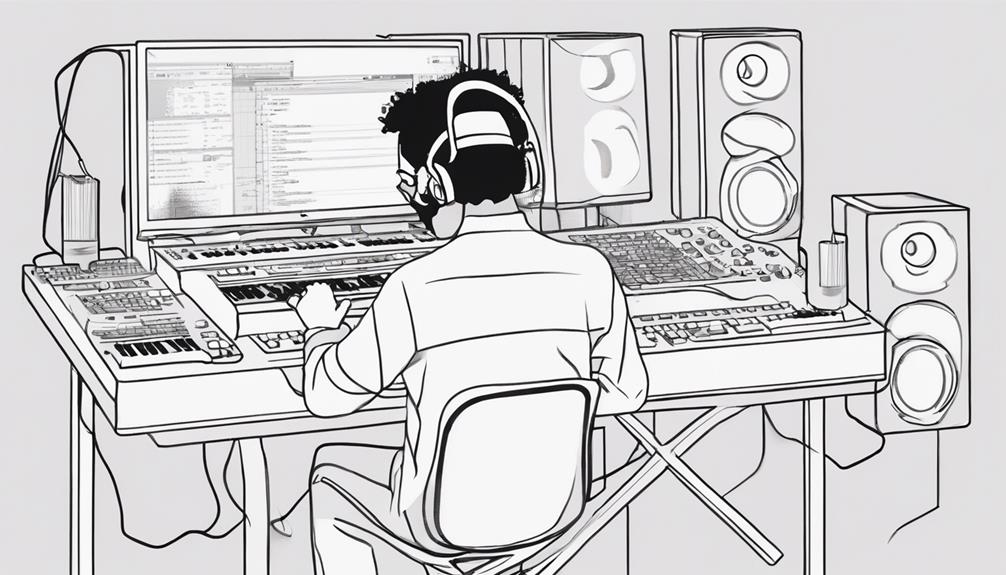
When starting out in music production, you must choose the right DAW that suits your style and workflow. Learning the key features of different DAWs will help you navigate the recording, editing, and mixing processes effectively.
Building your skills within your chosen DAW is essential for honing your craft and creating professional-quality music.
Choosing the Right DAW
Exploring different Digital Audio Workstations (DAWs) can help you find the right one for your music production needs. Popular choices like FL Studio, Ableton Live, and Logic Pro X each offer unique features catering to different preferences.
FL Studio stands out by providing extensive tools for music production and lifetime free updates once you purchase the software, ensuring you stay up to date with the latest advancements.
Ableton Live is praised for its intuitive workflow and exceptional performance capabilities, making it a favorite among many producers.
On the other hand, Logic Pro X is often the top choice for professionals due to its wide range of tools for music production.
To determine which DAW suits you best, consider exploring demo or trial versions. This hands-on experience allows you to test the software's interface, functionalities, and compatibility with your workflow. Take advantage of these trial periods to find the DAW that aligns most closely with your music production style and preferences.
Learning Key Features
To fully maximize your music production potential, familiarizing yourself with the key features of your chosen Digital Audio Workstation (DAW) is fundamental. DAWs like FL Studio, Ableton Live, and Logic Pro X offer a range of tools and functions that can enhance your music production process. Here are some tips to help you learn everything you need:
- Engage in online courses: Explore online tutorials and courses to grasp the basics of music production and DAW operation efficiently.
- Explore Ableton: If you're using Ableton, delve into its unique features and workflows tailored to electronic music production.
- Experiment with digital plugins: Get creative with digital plugins that can enhance your sound and offer new possibilities in your tracks.
- Train your ears: Develop your listening skills to identify nuances in sound quality, helping you make informed decisions during the mixing and mastering process.
Building Your Skills
Explore various popular Digital Audio Workstations (DAWs) like FL Studio, Ableton Live, and Logic Pro X to familiarize yourself with their unique features and workflows.
To start learning the skills you need, immerse yourself in using a DAW by experimenting with different tools and functionalities.
Practice creating beats, melodies, and arrangements within your chosen DAW to build proficiency and confidence in music production.
Utilize online tutorials and courses tailored to your DAW preference to deepen your understanding further.
Learning how to navigate the interface, use virtual instruments, and arrange tracks efficiently are essential steps in building your skills.
By actively engaging with your chosen DAW and seeking guidance from expert resources, you can enhance your music production capabilities and enhance your creative potential.
Cultivating Creativity and Patience
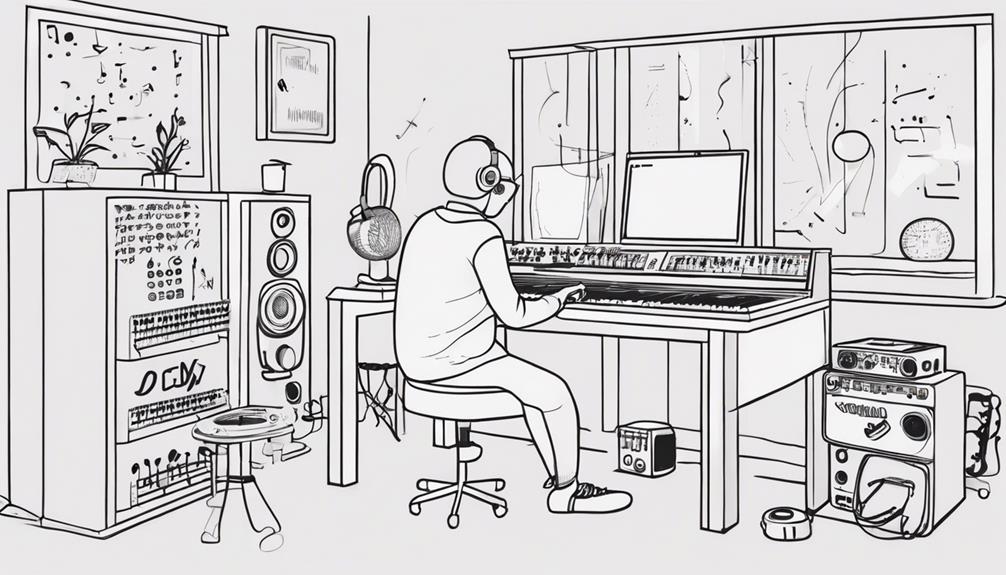
To excel in music production, you must nurture your creativity by exploring diverse sounds and techniques to craft your unique style.
Remember that patience is key in this journey, as perfecting your tracks will require time and multiple revisions.
Embrace challenges and learn from mistakes to refine your skills and develop a persevering mindset in your music production endeavors.
Fostering Artistic Inspiration
Cultivating creativity and patience is essential for fostering artistic inspiration in music production. To enhance your journey in this field, consider the following:
- Experiment with Different Sounds: By trying out various sounds, melodies, and arrangements, you can discover your unique style and push the boundaries of creativity.
- Be Patient with the Process: Music production often involves multiple revisions and iterations. Embrace the journey and trust that each step contributes to the final masterpiece.
- Explore Diverse Music Genres: Drawing inspiration from different genres can spark new ideas and help you develop a versatile approach to music production.
- Learn from Mistakes: View mistakes as valuable learning opportunities. Embracing errors can lead to refining your skills and shaping your artistic voice in innovative ways.
Developing Perseverance Mindset
Experimenting with different sounds and techniques can help you develop a perseverance mindset in music production, emphasizing the importance of staying motivated and dedicated to honing your skills.
Cultivating creativity requires patience, as it involves discovering your unique style through trial and error. Embracing mistakes as learning opportunities can lead to creative breakthroughs and innovative production techniques.
Developing a perseverance mindset means committing to the process, even when faced with challenges or setbacks. It's crucial to stay motivated and dedicated to your craft, understanding that proficiency takes time to develop.
Patience is key in music production; it's an iterative journey that requires dedication to achieve the desired results. By embracing the learning curve, staying committed, and seeking motivation in your work, you can push through obstacles and reach new levels of creativity in your music production endeavors.
Developing Trained Ears
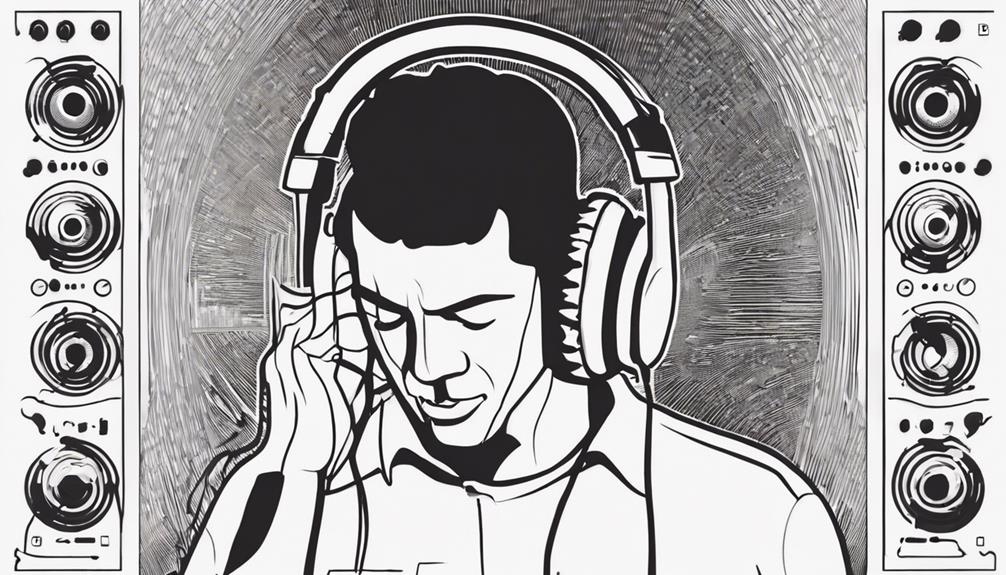
Enhance your music production skills by actively training your ears to recognize various sounds and musical elements.
To develop trained ears for music production, you must immerse yourself in diverse music genres to familiarize yourself with different sounds and instruments.
Practice identifying melodies, chord progressions, and song structures in songs to refine your ability to analyze music effectively.
Utilize ear training exercises and apps to sharpen your skills in distinguishing tones, pitches, and rhythms, allowing you to create more harmonious compositions.
- Listen to a variety of music genres
- Identify melodies, chord progressions, and song structures
- Use ear training exercises and apps
- Experiment with mixing and mastering tracks
Showcasing Your Unique Sound
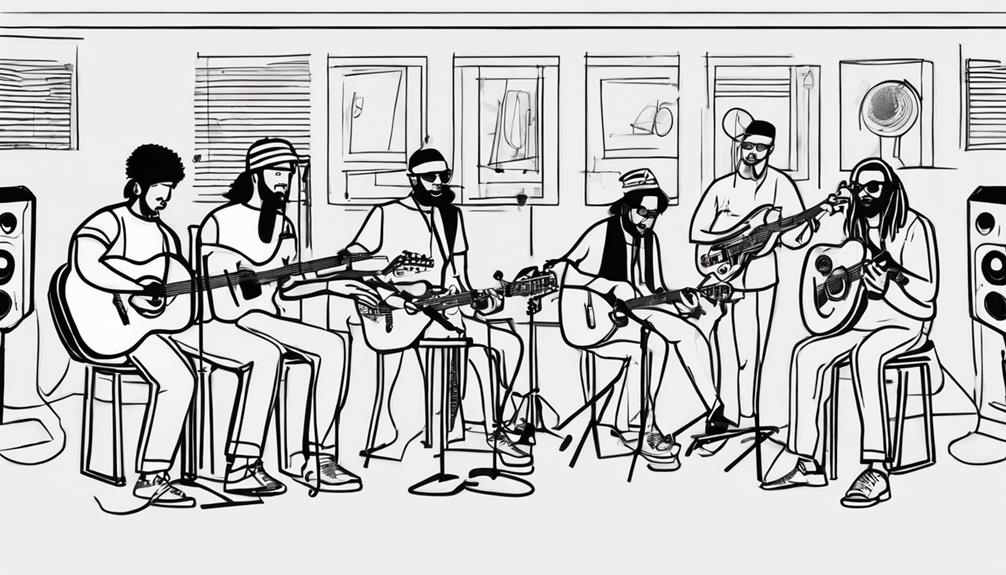
To stand out in the music production world, focus on developing your style, experimenting with sounds, and building your brand.
By honing in on what makes your music unique, you can create a signature sound that captures listeners' attention.
Showcasing your distinct creativity will help you leave a lasting impression and attract a dedicated audience to your music.
Developing Your Style
In discovering your unique style in music production, it's essential to explore a variety of sounds, instruments, and effects. By experimenting with different elements, you can truly shape a sound that's distinctively yours.
Here are some key steps to help you develop and showcase your style:
- Incorporate personal influences: Infuse your music with your own experiences and musical inspirations to create a sound that reflects your identity.
- Collaborate with other artists: Working with fellow musicians can bring fresh perspectives and ideas to the table, helping you refine your style through collaboration.
- Stay open to experimentation: Embrace new techniques, genres, and technologies to push the boundaries of your sound and keep evolving as an artist.
- Seek feedback: Constructive criticism can provide valuable insights to enhance your music production skills and refine your unique style.
Experimenting With Sounds
Experimenting with a diverse range of sounds is key to showcasing your unique sound in music production. By experimenting with different instruments, samples, and effects, you can develop a signature style that sets your music apart.
Utilize plugins and virtual instruments to create innovative and original sounds that captivate your audience. Don't shy away from incorporating unconventional sounds and textures into your tracks; these elements can make your music stand out from the crowd and leave a lasting impression.
To truly showcase your creativity, explore various genres and styles to find inspiration and incorporate diverse elements into your sound. Collaborating with other musicians and producers is also a great way to experiment with different sounds and ideas, leading to a fresh and unique sound that represents your artistic vision.
Embrace the process of experimentation in music production, and don't be afraid to push boundaries to discover the sonic landscape that truly resonates with you.
Building Your Brand
Establish a strong online presence through social media platforms like Instagram, SoundCloud, and YouTube to showcase your music production skills effectively.
To build your brand as a music producer, consider the following:
- Create a professional website or online portfolio to display your music projects, collaborations, and achievements in music production.
- Utilize platforms like Bandcamp, Spotify, and Apple Music to distribute your music and reach a wider audience, enhancing your brand as a music producer.
- Collaborate with other artists, producers, and musicians to expand your network, gain exposure, and create unique music projects that reflect your signature sound.
- Engage with your audience through live streams, online tutorials, and behind-the-scenes content to build a loyal fan base and connect with music enthusiasts interested in your music production journey.
Pursuing Music Production Certifications
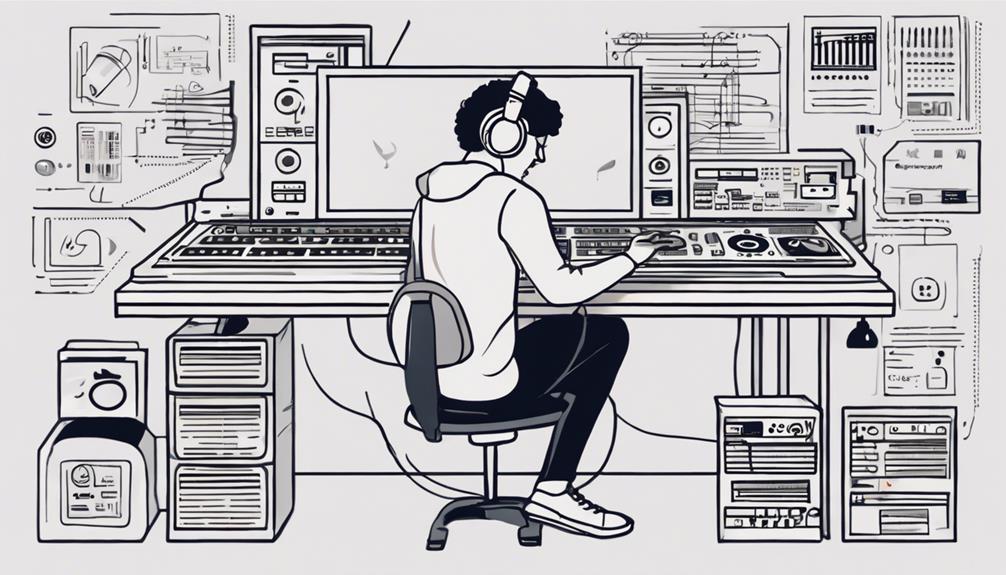
Consider pursuing music production certifications to enhance your credibility and skillset in the industry. Certifications such as Pro Tools Expert and Ableton Certified Training provide specialized training that can set you apart in the competitive field of music production. By obtaining these certifications, you not only showcase your dedication but also open up better job opportunities and gain industry recognition.
These certifications often require passing exams or completing specific training programs, demonstrating your commitment to honing your craft. Employers and clients value individuals with proven expertise and technical knowledge, making certification a valuable asset in your music production career.
Investing in music production certifications not only enhances your skills but also boosts your confidence in your abilities. The recognition and opportunities that come with being certified can propel your career forward and establish you as a credible professional in the industry.
Embracing the Creative Process
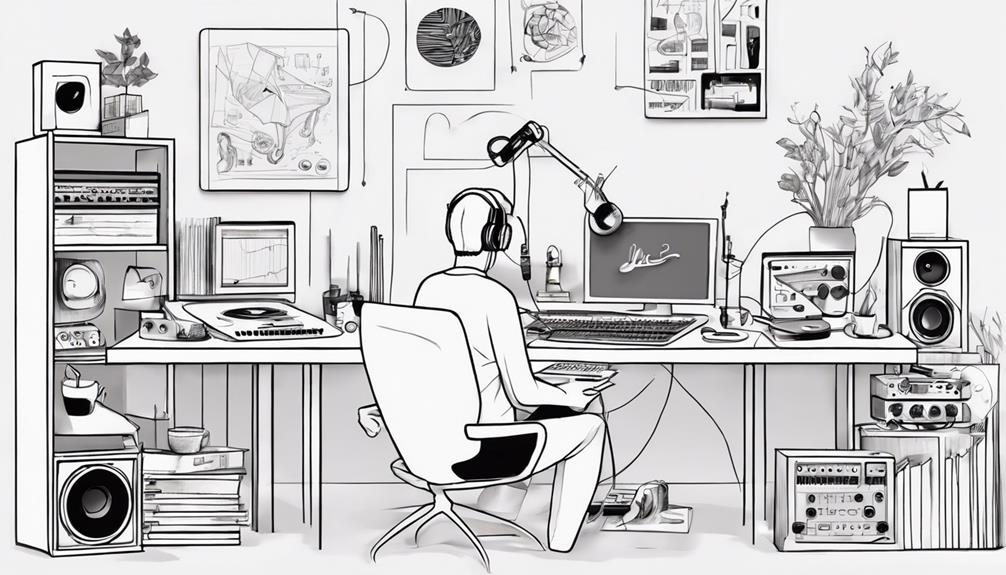
To fully immerse yourself in the world of music production, it's crucial to embrace the creative process. When creating music, remember to prioritize experimentation and creativity. These elements will help you develop a unique style that sets you apart in the industry.
Regular practice is key to enhancing your skills and confidence in the creative process. Collaborating with other musicians and producers can also provide you with new perspectives and ideas, enriching your music production journey.
Don't shy away from making mistakes along the way, as they often lead to innovative breakthroughs and unexpected discoveries. Remember to enjoy the journey of music production, staying open to new inspirations and techniques that may come your way.
Embracing these aspects won't only make you a better music producer but will also enrich your overall experience in the field.
Enhancing Skills Through Practice
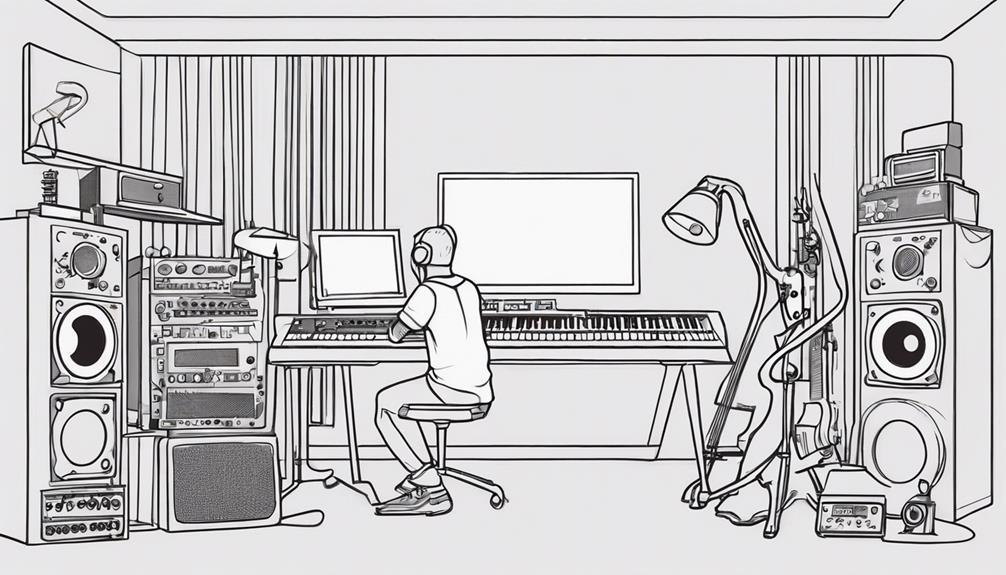
To level up your music production abilities, dedicate time for regular practice sessions focusing on beat-making, mixing, and mastering techniques. By practicing regularly, you can improve your skills and become more proficient in your craft.
Experiment with sounds, techniques, and genres to broaden your music production knowledge and discover new creative possibilities. Seeking feedback from peers and professionals is essential to enhancing your work and gaining valuable insights from different perspectives.
Consider joining workshops and classes on music production to gain practical experience, learn new techniques, and network with like-minded individuals in the industry. Additionally, honing your craft daily by dedicating time to experimenting with new sounds and pushing your creative boundaries will help you grow as a music producer.
Frequently Asked Questions
How Do I Get Started in Music Production?
To get started in music production, familiarize yourself with software like FL Studio. Learn music theory basics for chord progressions. Practice making beats with loops and samples. Immerse yourself in online tutorials for more skills. Experiment with various genres for your unique sound.
How to Get Experience in Music Production?
To get experience in music production, volunteer at studios or events, assist established producers, attend workshops, collaborate with others, and create your own projects. This hands-on approach will help you learn and grow in the field. Additionally, consider enrolling in formal education programs to deepen your understanding of the craft and gain access to valuable resources. The music production degree process often provides structured learning, mentorship opportunities, and exposure to industry-standard tools and techniques. Combining formal education with practical experience will give you a well-rounded foundation to excel in the field.
Is It Too Late to Start Music Production?
Hey, it's never too late to immerse yourself in music production! Age isn't a limit. With dedication and practice, you can start your journey today. Embrace your passion, explore your creativity, and enjoy the process!
Where Do I Start When I Want to Make Music?
Start by diving into music production software like Ableton Live or FL Studio. Learn music theory basics like chords and melodies. Experiment with beats and loops. Watch tutorials for tips. Practice consistently and get feedback to grow your skills.
Conclusion
So, begin your music production journey today!
Immerse yourself in the world of digital audio workstations, acquire the basics of music theory, and nurture your creativity with patience.
Showcasing your unique sound and pursuing certifications will enhance your skills.
Embrace the creative process and remember, practice makes perfect.
Get grooving and grow in your production prowess!

